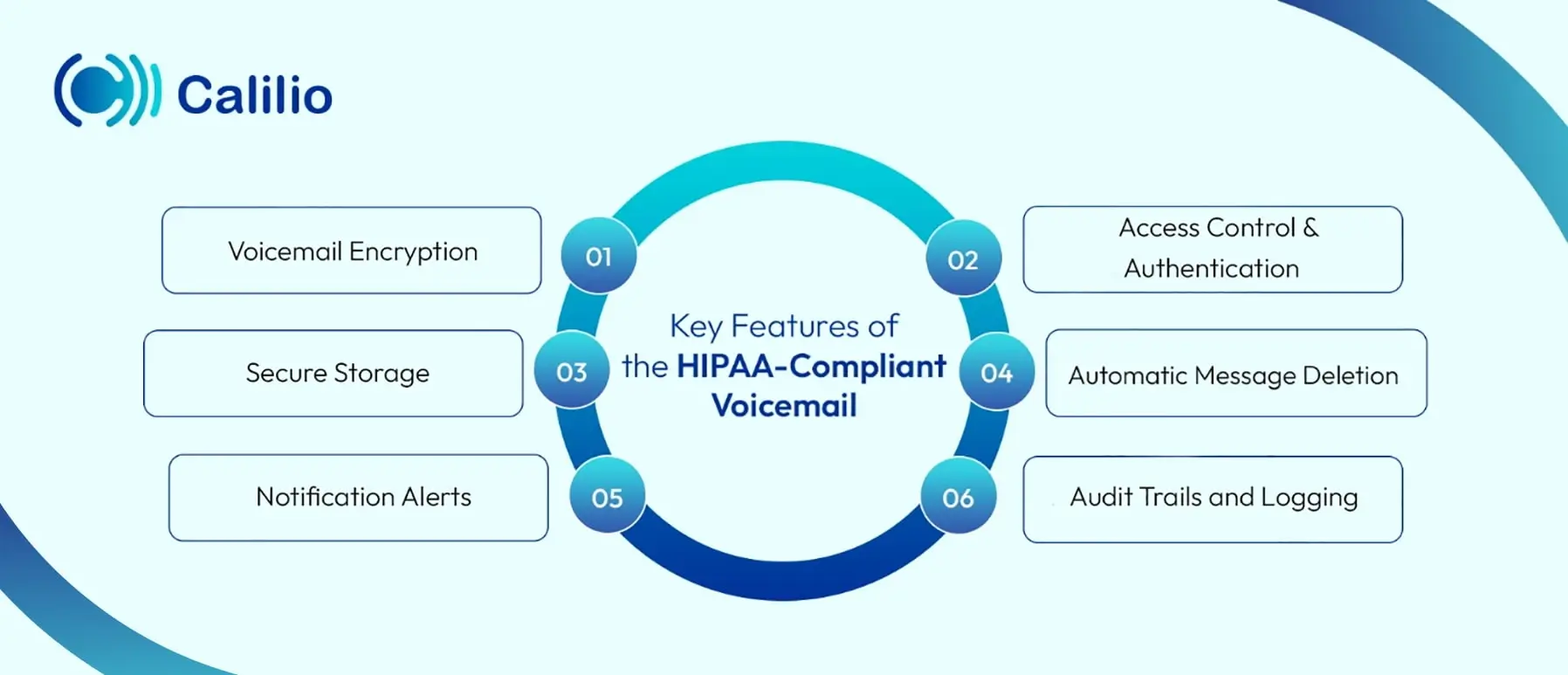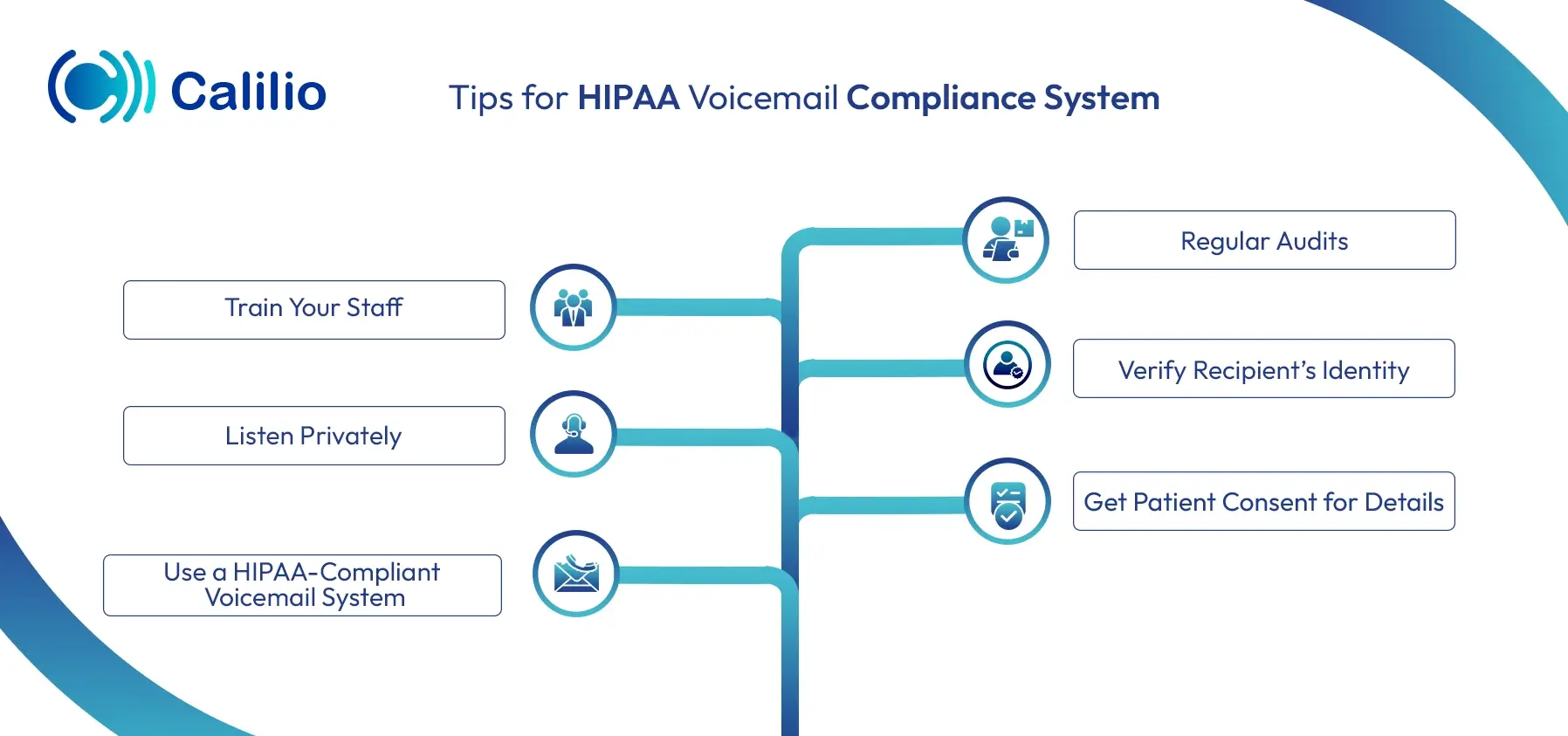HIPAA-Compliant Voicemail: A Guide to Protect Patient Privacy

Many healthcare practices use standard voicemail systems that lack the necessary security features to protect patient information. So, unauthorized individuals can easily access sensitive details, such as test results and diagnoses. This can result in serious legal complications and a loss of patient trust, all of which can harm your practice’s reputation.
A HIPAA-compliant voicemail addresses these issues by offering robust security features, including encryption and password protection. It ensures that patient information remains private and secure, protecting your practice from legal risks.
In this blog, we'll explore what makes a voicemail system HIPAA-compliant, why it matters, and its key features, alongside some HIPAA-compliant voicemail script examples.
Keep reading!
Key Highlights:
A HIPAA-compliant voicemail ensures patient information is protected through encryption and access controls, preventing unauthorized access.
Key features include message encryption, access control with PINs or passwords, secure storage, customizable greetings, automatic message deletion, alerts, and audit trails.
A HIPAA-compliant voicemail safeguards patient privacy, helps avoid legal issues, fosters trust with patients, improves communication efficiency, and shows professionalism.
To create a HIPAA-compliant voicemail script, keep it simple and professional, avoid mentioning sensitive information, and always include a confidentiality statement.
What is a HIPAA-Compliant Voicemail?
HIPAA-compliant voicemails only include basic, non-private information and do not contain details regarding the patient’s health condition.
Why Does HIPAA-Compliant Voicemail Matter?
HIPAA-compliant voicemail safeguards patient information and confidential healthcare data. It builds patient trust, adheres to the legal regulations, and demonstrates professionalism.
- Protect Patients’ Privacy: Make sure patient information, such as prescriptions and diagnoses, remains confidential.
- Prevent Legal and Financial Consequences: Non-compliance with HIPAA can lead to hefty fines, legal action, and significant damage to your practice’s reputation.
- Secure Communication: Data encryption ensures that voicemail messages are securely stored and transmitted, and accessible only by authorized individuals.
- Patient Trust: A confidential voicemail system builds trust and improves the overall patient experience, strengthening the relationships between patients and healthcare.
- Professionalism: Using a HIPAA-compliant voicemail system demonstrates your commitment to patient confidentiality and professionalism.
What are the Key Features of a HIPAA-compliant Voicemail?
The key features of any HIPAA-compliant voicemail include message encryption, strong authentication, and audit control for tracking activity. It should also offer secure message storage and automatic deletion to prevent breaches and security risks.

- Voicemail Encryption: Voicemail messages are encrypted before sending to protect sensitive patient data.
- Access Control & Authentication: A PIN or password is required to access voicemail, ensuring only authorized users can listen to the messages.
- Secure Storage: Messages are securely stored, often shielded by encryption or with access restrictions.
- Automatic Message Deletion: The voicemail messages are automatically deleted after a certain period to prevent unauthorized access to outdated patient information.
- Notification Alerts: Send alert notifications when voicemails are accessed to detect unauthorized access.
- Audit Trails and Logging: It tracks who accesses messages and when, ensuring accountability and transparency.
Things to Consider When Creating a HIPAA Compliant Voicemail
When creating a HIPAA-compliant voicemail script, ensure it’s simple, concise, and avoid including private or sensitive information. It’s also important to include a confidentiality statement and provide instructions for urgent matters.
1. Keep Voicemail Simple and Professional
Your voicemail script should be clear and professional in tone. Avoid using lengthy and casual phrases, and keep your messages straightforward and general. A concise message reduces the chances of error or confusion and makes it easier for the caller to know precisely what to do next.
2. Avoid Discussing Sensitive Information
Your voicemail greeting should never contain any Protected Health Information (PHI), such as medical conditions, treatments, prescriptions, or anything related to a patient’s health. If you include them, anyone accessing the voicemail will know private information about the patient that they wouldn’t want to share with others.
3. Include a Confidentiality Statement
Always inform the caller that voicemails are not intended for sharing sensitive information. Instead, offer secure alternatives, such as calling back directly or using the patient portal.
4. Provide Instruction for Urgent Matters
Many patients may call with urgent concerns that require immediate attention. If the matter is serious, give clear instructions on what to do. Clear instructions help patients with urgent issues receive the necessary assistance quickly and avoid confusion.
Get A Cloud Phone System For Healthcare Professionals With Built-in Voicemail Feature!
HIPAA Compliant Voicemail Examples
Below are some examples of HIPAA-compliant voicemails for appointment reminders, lab test notifications, prescription pickups, follow-ups, billing reminders, and insurance requests, all without disclosing PHI.
Example 1 - Appointment Reminder
"Hello, this is [Your Practice Name]. We’re calling to remind you of your upcoming appointment on [Day] at [Time]. If you need to reschedule, please contact us at [Phone Number]."
This message is brief and professional, only mentioning the appointment time and contact details.
Example 2 - Notify Lab Test Results
"Hi, this is [Your Practice Name]. We have your test results ready. Please call us at [Phone Number] to discuss them."
The voicemail avoids disclosing any specifics about the test results. Instead, it directs the patient to a secure channel for further communication, preserving the confidentiality of their medical information.
Example 3 - Prescription Pickup Notification
"Hello, this is [Pharmacy Name]. Your prescription is ready for pickup. If you have any queries, please contact us at [Phone Number]."
The message simply informs the caller that their prescription is ready without specifying the type of medicine, ensuring that sensitive health information remains confidential.
Example 4 - Follow-Up Message
"Hello, this is [Doctor’s Name]’s office or [Hospital Name]. We would like to follow up regarding your recent visit. Please call us at [Phone Number] at your convenience. Thank you."
This message focuses only on scheduling a follow-up and does not mention any health-related information, ensuring that no PHI is shared or exposed.
Example 5 - Billing Reminder
"Hello, this is [Your Practice Name]. We are calling regarding your recent billing statement. Please contact us at [Phone Number] to discuss any questions or concerns."
This message only mentions billing details and avoids discussing any services or health information on the bill, keeping it simple and compliant with HIPAA.
Example 6 - Insurance Information Request
"Hello, this is [Your Practice Name]. We are requesting additional insurance information. Please contact us at [Phone Number] during office hours to provide the necessary details."
This voicemail simply requests insurance details without disclosing PHI, maintaining HIPAA compliance.
Additional Tips for HIPAA Voicemail Compliance System
For HIPAA-compliant voicemail, healthcare practices must use secure voice message systems, always confirm the recipient before leaving any message, and listen to voicemails in private. Also, ensure to get patient consent before sharing detailed info, regularly train staff, and audit the system to stay compliant.

1. Use a HIPAA-Compliant Voicemail System
To ensure your voicemail system complies with HIPAA, use a secure voicemail system, such as HIPAA-Compliant VoIP, which offers built-in compliance features. Make sure the provider also signs a Business Associate Agreement (BAA) to ensure full HIPAA compliance.
2. Get Patient Consent for Details
Always get explicit patient consent before leaving sensitive health information (like test results or diagnoses) in a voicemail. Patients may not prefer to receive such details via voicemail due to privacy concerns. Obtaining consent demonstrates that you respect their preferences and ensure compliance with HIPAA regulations.
3. Listen Privately
Always listen to voicemail messages containing patient information in a private setting. Public or shared spaces expose patient data to potential unauthorized listeners, which is a clear violation of HIPAA regulations. This simple practice reduces the risk of accidental disclosure and helps maintain confidentiality, protecting both your practice and patients' details.
4. Verify Recipient’s Identity
Before leaving any voicemail that contains PHI, it’s crucial to verify that the recipient is authorized. This can be done by using a PIN or password system to confirm the identity of the person retrieving the voicemail. Verifying the recipient's identity before sharing any sensitive data ensures that the information reaches the right person and prevents unauthorized access.
5. Train Your Staff
Even the most secure voicemail system is only as effective as the people using it. Provide regular HIPAA training for all staff members who handle voicemails. Training should cover the proper handling of PHI, the importance of confidentiality, and how to utilize your voicemail system's security features.
6. Regular Audits
Perform routine audits of your voicemail system to maintain HIPAA compliance. Audits help identify vulnerabilities, such as unauthorized access or old PHI records. They also track who accessed voicemails and when, making sure only authorized personnel review sensitive data. Scheduling regular audits also allows you to identify potential violations and take corrective action before they turn into a serious issue.
Conclusion
A HIPAA-compliant voicemail is crucial for protecting patient privacy, ensuring legal compliance, and maintaining trust. Healthcare providers must ensure that messages are encrypted, avoid disclosing sensitive health details, and are only accessible to authorized staff.
Summarize this blog with:
Frequently Asked Questions
Is voicemail-to-email HIPAA compliant?
No, voicemail-to-email isn’t inherently HIPAA compliant. To ensure safety, use a secure voicemail system, avoid including confidential information in messages, and obtain the patient’s consent before sending voicemails via email.
Can I make my voicemail HIPAA-compliant?
Are there any free, HIPAA-compliant voicemail services available?

Still have questions?
Can’t find the answer you’re looking for? Please chat with our friendly team.
Stay in the loop
Get the latest call insights, trends, and updates delivered straight to your inbox.
By subscribing, you agree to receive updates from Calilio.
You can unsubscribe anytime.
